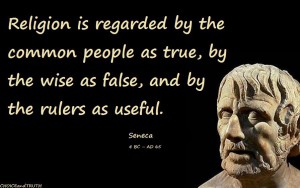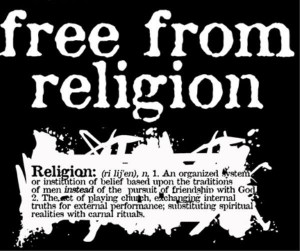 [First posted 2012. To this day, Sinaites constantly correct the misperception that Sinai 6000 is a new ‘religion’ and therefore is relegated to ‘cult’, according to Christianity’s definition of what’s cultic, i.e., any deviation from the Christian doctrine. We claim to be a way of life, following the commandments of the God we embrace. Read on.—-Admin1]
[First posted 2012. To this day, Sinaites constantly correct the misperception that Sinai 6000 is a new ‘religion’ and therefore is relegated to ‘cult’, according to Christianity’s definition of what’s cultic, i.e., any deviation from the Christian doctrine. We claim to be a way of life, following the commandments of the God we embrace. Read on.—-Admin1]
———————
Sinaites define “religion” as a man-initiated attempt to relate to an unknown supernatural power. Religion is human-sourced, based on man’s philosophical musings, speculations, logic, conclusions leading to beliefs and convictions about a supernatural entity whom man wants to know but cannot see or prove, but feel a spiritual link with.
This man-initiated attempt might begin with—
- simply recognizing that there is a higher power,
- then move on to seeking to know him,
- and further to defining and naming him;
- and determining ways to please, placate, worship him;
- and finally to living according to how man thinks this god requires him to live.
All beliefs in a deity might loosely fall under “religion.” In this sense, religion is good, because at least there is an acknowledgment of God’s existence followed by accountability to God. It should make a difference in how he lives his life on earth, how he uses his time, opportunities, giftings, etc.
[AST] Proverbs 9:10-11
“The beginning of wisdom is fear of HaShem
and [the beginning of] understanding is
knowledge of the sacred.
For through me your days will be increased,
and they will increase years of life for you.
If you have become wise,
you have become wise for your own good,
and if you have scoffed,
you alone will bear [responsibility].”
Some people end their speculation with an awareness of God and go no further. Others progress to the next step—how do I get to know this Being, this Entity?
The normal route resorted to is—they turn to existing religious sects, small groupings or communities, persuaded that the leaders know more than they do about “the way” to God. There are many institutionalized religions that have world-wide reach and influence, one doesn’t have to stick his neck out to join any of them; they’re out to go after any seeker.
The goal of a God-seeker is simply to know God, if that is at all possible. It starts as a personal quest but as one starts relating to others with the same objective, they start connecting with other seekers. Before you know it, they form fellowships, religious communities, then institutionalize into churches. Each tends to have an exclusive claim to truth and to being the right religion and the only way to God.
History has a sad record of the evils of religion, so that’s the BAD part of religion. It tends to promote self-righteousness, intolerance, exclusivism, bias towards others of different faiths, tunnel vision, persecution, fanaticism, to name a few. The Crusades and the Inquisition all but eliminated any opposition or challenge to the beliefs espoused by Catholicism. Cultic leaders are able to influence their flock to practice polygamy, isolate themselves in communities to wait for the end of the world and worse, cultic leaders like Jim Jones was able to delude his flock towards mass suicide. Religious fanatics go so far as burning themselves in public for a cause and in the case of terrorists, suicide bombers are able to cause as much death and destruction to others. [Update 2017: The rise of fanatic terrorists with an agenda supposedly rooted in their religious affiliation which they justify for the use of brutality, destruction and mass murder is the most recent example of the evil resorted to by misquided religionists who do what they do in the name of their God.]
If there is a sure turnoff for the agnostics and atheists of the world, that would be religion and all the bad it does, ironically and unfortunately, “in the Name of God.”
So where does a sincere God-seeker/Truth-seeker turn to, if not religion?
For us, after being in religion for majority of our lifetime and getting out of religion, we have discovered that there IS another way: studying for ourselves the original revelation of God . . . that would be the Sinai revelation recorded in the five books attributed to Moses—the Torah. Get to know the God Who revealed Himself, His Name, and His will for all humanity. That God, we have decided for ourselves, is the God who spoke His Words and taught His Way from His Sinai Revelation. His Name is YHWH. We share what we learn; we believe that relentless true God-seekers will eventually find Him just as we did . . . our search led us to Sinai, others’ might end up somewhere else. God’s presence is limitless, He is discoverable even in nature where His Designer’s Fingerprint is obvious to minds that know and acknowledge that nothing exists without a ‘maker’. One could speculate forever how to relate to this invisible God, that would be “religion”. But one could also decide after much research and study to believe or not believe that an invisible God who created His visible world would want to communicate to His sentient creatures about who He is, what He’s like, and what He requires of the one He made in His image. Studying His recorded ‘communication’ with man is the beginning of having a relationship with that God. We have decided for ourselves that the One True God’s loving message to man is found in the Hebrew Scriptures, particularly in the Torah.
We believe that each individual’s goal in life is —
to personally know the One True God,
be in relationship with Him
by acknowledging Him as Lord and King;
then as His subject,
live His Guidelines for Life,
Instructions for Living,
His Torah . . .
not membership in a ‘religion’.




